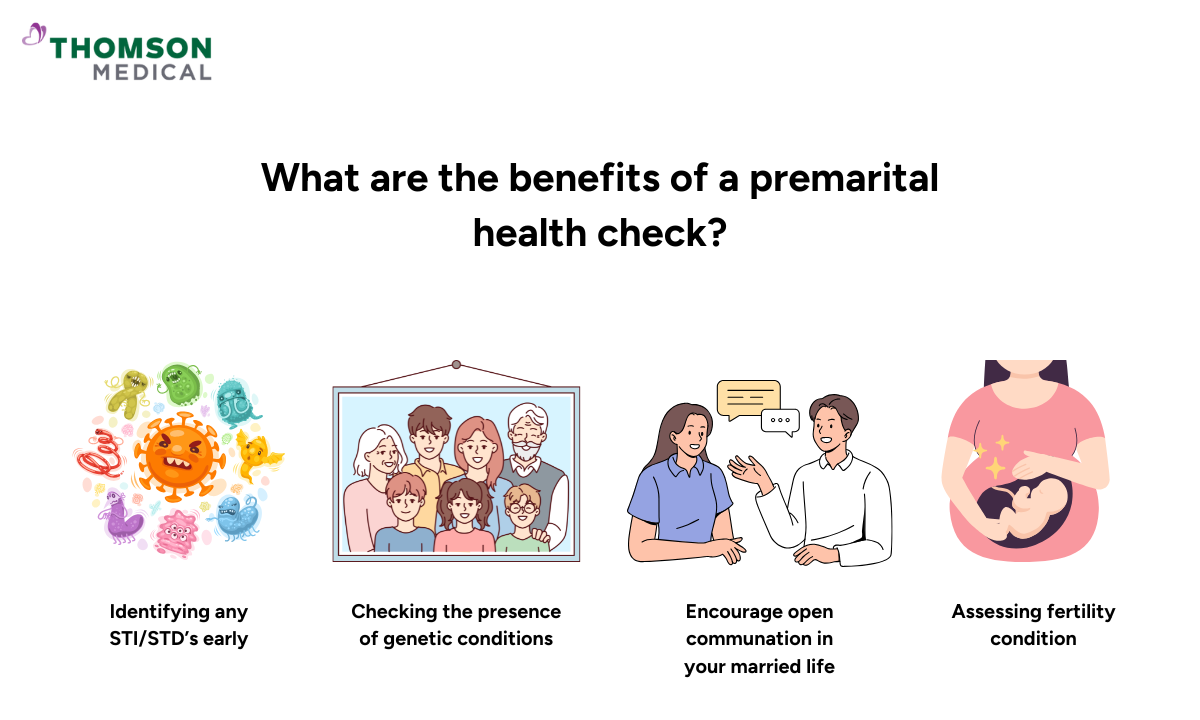While planning a wedding is exciting, planning a healthy future together is equally important. That's where real peace of mind begins. As you coordinate venues and guest lists, shouldn't you also coordinate the health decisions that will affect your entire married life? Premarital health screening gives engaged couples the clarity and confidence to start their marriage with complete transparency about their shared health future.
What are the benefits of a premarital health check?

When you enter marriage, your health becomes a shared responsibility. By understanding each other's health status, you can support each other and make informed decisions when your partner does experience health conditions in the future. Here are some other benefits of this screening:
Assessing you and your partner's overall health status, including fertility health.
Early identification of infectious diseases, such as sexually transmitted infections, to reduce the risk of transmission and help plan further treatment.
Minimising the risk of severe health complications due to late diagnosis.
Screening for genetic conditions that could affect your future children.
Assisting you in making more informed decisions regarding your health and family planning.
Encourage open communication with your partner about each other's healthcare needs and how to tackle any potential challenges or major health conditions together.
Premarital health screening is not just about preventing health issues, it's also about building a strong foundation for a healthy marriage. By being open about any potential health concerns, you and your partner can work together to overcome any health challenges that may come.
What tests are available for premarital screening?
A premarital health screening involves a range of tests to evaluate both you and your partner general health. It also helps to identify any potential health risks that could affect your future family, particularly if you're planning to have children.
Although they may seem similar to regular health screenings, premarital screenings actually focus more on health factors that could affect fertility, pregnancy, and the health of your future children. Regular health screenings concentrate on identifying chronic diseases like high cholesterol, diabetes, and cancers.
Healthcare providers in Singapore offer various premarital health screening packages for couples. While the available packages may differ between providers, most include the following screenings:
Infectious diseases screening
An infectious disease screening helps to identify infections that could affect your health, your partner’s wellness, and the health of your future child. Early detection also prevents disease transmission and supports healthy relationships by providing transparency between couples.
Here are some common infectious diseases included in premarital screening:
HIV/AIDS screening:
HIV (human immunodeficiency virus) is a sexually transmitted infection (STI) that attacks the immune system, reducing its effectiveness in fighting infections and diseases.
Without treatment, HIV can continue to weaken the immune system until it becomes severely compromised and develops into an acquired immunodeficiency syndrome (AIDS).
Chlamydia screening:
Chlamydia is a common STI caused by the Chlamydia trachomatis bacteria, which doesn’t always cause symptoms.
When symptoms do appear, they usually show as a burning sensation when urinating in women and watery discharge from the tip of the penis in men.
Gonorrhoea screening:
Gonorrhoea is a common STI caused by the bacterium Neisseria gonorrhoeae. It usually causes symptoms such as unusual vaginal discharge in women and testicular pain in men.
Hepatitis B and C screening:
Hepatitis B and C are viral infections that affect the liver. Hepatitis B is primarily spread through blood, semen or other bodily fluids, whereas hepatitis C is primarily spread through direct, blood-to-blood contact.
Symptoms of this condition include fatigue, yellowing of the skin or eyes (jaundice), dark urine, and nausea.
Syphilis screening:
Syphilis is an STI caused by the bacterium Treponema pallidum. It usually starts with a painless sore that often appears on the genitals, rectum, or mouth.
Rubella (German measles) screening:
Rubella, also known as German measles, is usually a mild viral infection. However, if a mother is infected during pregnancy, this condition can cause birth abnormalities.

Genetic testing
Genetic testing is an important part of premarital health screening, particularly for couples with a family history of inherited diseases. Knowing whether you or your partner have certain genetic abnormalities can help you make an informed decision about family planning and reduce the likelihood of passing them on to your future children.
Some of the most common genetic abnormalities checked for in premarital health screenings include:
Thalassaemia:
Thalassaemia is a genetic blood disorder that affects the body’s ability to produce haemoglobin, the protein in red blood cells responsible for carrying oxygen.
If you or your partner carry the thalassaemia gene, it can be passed on to your children and lead to anaemia.
G6PD deficiency:
Glucose-6-phosphate dehydrogenase (G6PD) deficiency is a common genetic blood disease that can cause red blood cells to break down prematurely (haemolysis).
This medical condition can lead to haemolytic anaemia, which occurs when red blood cells are destroyed faster than they can be replaced by the body.
Cystic fibrosis:
Cystic fibrosis is a genetic condition that causes thick, sticky mucus to build up in the lungs and digestive tract. This medical condition can lead to long-term lung infections and digestive issues.
Sickle cell anaemia:
Sickle cell anaemia is a genetic blood disease characterised by abnormally shaped red blood cells (crescent or sickle-shaped) that can block blood flow and cause pain and organ damage.
Premarital Health Screening Doctors
Loading...
Fertility testing
Early fertility testing during a premarital health check can help identify potential fertility issues early on, provide peace of mind, and support you on your family planning journey. Fertility testing evaluates both you and your partner’s reproductive health, offering an overview of your chances of conceiving.
These insights are especially valuable for couples where age may be a contributing factor in declining fertility and can help you make informed decisions about family planning and healthy pregnancies.
For women
To ensure your fertility before marriage, a hormonal profile test is usually performed, which includes:
Follicle-stimulating hormone (FSH) test:
This test assesses ovarian function and egg development.
High FSH levels, particularly at the beginning of the menstrual cycle, may suggest a reduced ovarian reserve and potential fertility issues.
Luteinising Hormone (LH) test:
The LH test measures LH levels to evaluate your ovulation cycle and identify medical conditions affecting the ovaries.
The Anti-Müllerian Hormone (AMH) test:
An AMH test is used to assess your fertility status by checking both your ovarian reserve and egg supply.
Oestrogen and progesterone tests:
These tests evaluate the regularity of your menstrual cycle and your ovulation status, ensuring an optimal chance of conception.
Thyroid function and prolactin tests:
These tests look for thyroid disorders and elevated prolactin levels, both of which can significantly impact menstrual cycles and fertility.
Additionally, a pelvic ultrasound scan may also be performed to examine your ovaries and uterus and to check for any medical conditions affecting your reproductive organs.
For men
To ensure optimal male fertility health, a semen analysis is performed as part of the premarital health screening. This analysis examines several key health factors affecting sperm fertility. These factors include:
The number of sperm present in semen (sperm count)
How well the sperm can move to reach and fertilise the egg (motility)
Sperm shape and structure (morphology)
Additional parameters that affect sperm health and viability, such as semen volume and pH levels, may also be checked during this screening.
If the semen analysis reveals fertility issues, a hormone test will be performed to evaluate essential hormones such as testosterone, which plays a key role in sperm production and male reproductive function.

Additional health screening
In addition to the infectious disease, genetic, and fertility tests mentioned above, some additional screening may be performed, which includes:
Blood group and rhesus factor test:
Your healthcare provider performs this test to determine both your and your partner’s ABO blood type and Rhesus (Rh) factor. If the mother is Rh-negative and the future baby is Rh-positive, or if there is a blood type incompatibility, the mother’s immune system may produce antibodies that attack the baby’s red blood cells.
This blood disorder can cause haemolytic disease, which is a serious condition that leads to anaemia and jaundice in newborns.
Full blood count:
A full blood count screening helps identify conditions such as anaemia, infections, and underlying blood disorders, all of which can affect general well-being and pregnancy outcomes.
We recommend that couples complete their premarital screening several months before their wedding. This allows ample time for treatment, follow-up consultations, and thoughtful family health planning.
The screening also acts as a precautionary measure against unexpected serious health conditions that could present unforeseen challenges to married couples. Understanding both aspects of your health together enables you and your partner to work as a team to address any potential future challenges.
Premarital health screening cost in Singapore
In Singapore, premarital health screenings are available at various public and private hospitals, polyclinics, and women’s health centres. Healthcare providers usually offer these screenings in different package options, with separate packages for males and females or bundled as couple packages.
The cost of the screening varies depending on the provider and package chosen. In general, individual packages for men start from SGD 110 to 290, while individual packages for women start from SGD 120 to 290. However, the price for a couple's package can go as high as SGD 600.
Screening with us
At Thomson Medical, we understand that planning for your future health together is just as important as planning your wedding. To help ensure that you and your loved one enjoy a smooth married life, we provide:
One-stop service:
We handle your screening, consultation and follow-up appointment under one roof, so there's no need to visit different clinics or coordinate multiple appointments.
Same-visit testing:
You and your partner complete all tests during the same visit, making it easy to fit into your busy wedding planning schedule.
02 consultations:
These consultations with our specialists aim to review your reproductive health based on your health history and current status and share available treatment options if necessary.
What to expect from your results
After performing your premarital health screening, here's what you can expect to receive:
Confirmation of your and your partner general health
Results for infectious diseases, along with any necessary treatment plan
Information about any genetic risks found
Insights into your fertility status, such as low ovarian reserve or sperm abnormalities
Recommendations for a follow-up appointment
Our doctors will help to explain your results in clear, easy-to-understand terms and advise you on any necessary next steps. Don’t hesitate to ask them if you have questions about this check-up or your results.
FAQ
Where can I do premarital screening in Singapore?
In Singapore, you have several healthcare options for premarital health screening. You can choose from:
- Public or private hospitals
- Polyclinics
- Specialist fertility clinics
- Women’s health centres
- General practitioner (GP) clinics that offer screening packages
What does the premarital screening package include?
Most screening packages cover:
- Full blood count
- Infectious disease screening (such as hepatitis, HIV, and syphilis)
- Genetic screening (such as thalassemia)
- Fertility tests
Don't hesitate to enquire about the specific tests each screening includes, as each provider's packages may vary.
How long does it take to receive the screening results?
You can expect results for a basic premarital screening within 1 to 3 days. For genetic or fertility tests, however, results may take up to two weeks. Your healthcare provider will keep you updated and arrange a follow-up appointment once your results are ready.
Can we undergo premarital screening after marriage?
Yes, although it is best to be screened before getting married or becoming pregnant, you can still be screened at any time, particularly if you are planning to start a family.
Is premarital screening only for couples planning to have children?
Not at all. Since premarital screenings are about building a strong foundation for your life together. It can also help you:
- Understand your health better
- Protect each other's health
- Prepare for your future together
Taking a premarital screening test shows your commitment to caring for each other and is an essential step in family planning.
Why is a thalassaemia test done before marriage?
Thalassaemia is a hereditary blood disorder. If you and your partner both carry the gene, there is a risk of passing it to your future child. Testing for this genetic condition can help both of you:
- Understand your genetic risks
- Explore options for family planning and medical support
- Make informed decisions together.
The information provided is intended for general guidance only and should not be considered medical advice. For personalised recommendations and tailored advice, schedule a consultation with Thomson Medical today.
For more information, contact us:
Thomson Medical Concierge
- 8.30am - 5.30pm
- WhatsApp: 9147 2051
Need help finding the right specialist or booking for a group?
Our Medical Concierge is here to help you. Simply fill in our form, and we'll check and connect you with the right specialist promptly.
Notice:
The range of services may vary between Thomson clinic locations. Please contact your preferred branch directly to enquire about the current availability.
Get In Touch


.png?branch=production)